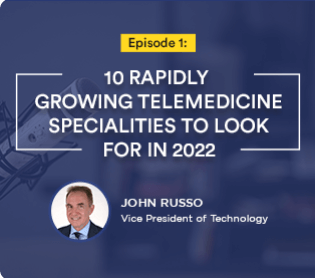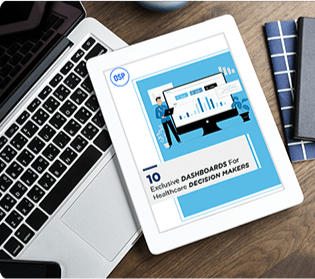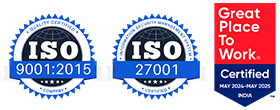Introduction
Hospitals face multiple challenges in managing their financial statement, especially manually. These financial statements show information and outcomes of various operations within the organization. Information in the financial statement is related to the hospital or healthcare center’s assets, expenses, revenues, and liabilities. Healthcare providers must pay special attention to financial management to avoid loss of cash inflow.
Today technologies in healthcare are automating and simplifying most of the administrative and clinical tasks. Be it mHealth or electronic health records, these healthcare providers’ solutions have benefited in many ways. The financial information system in healthcare is also an emerging technology that helps providers manage their costs and ensure efficient care. Financial systems in healthcare reveal a lot about the businesses and their care quality. Besides, the financial information system of a hospital is a structured approach to information collection and interpretation. As mentioned earlier, hospital assets, liabilities, revenues, and other costs are all information required for financial information systems. Errors in this information or mismanagement can affect the functioning of the organization. Moreover, financial security in healthcare information systems is vital for the smooth functioning of care services.
Before we detail the financial security system in healthcare, you must understand that financial analysis in healthcare is important. Tracking and analyzing the financial ratios show the cost of operations, cash inflow, and profitability. So, deploying custom healthcare solutions for hospital financial information is a must-have today.
Benefits of Using Financial Information System in Healthcare
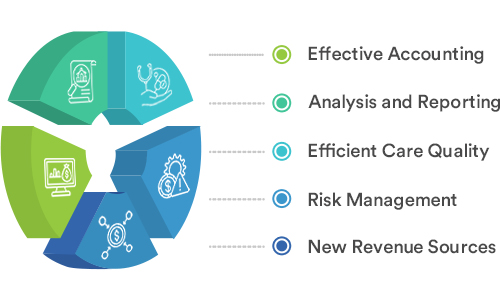
Providers deploy technologies like Clinical data analysis or clinical informatics solutions for health information analysis. Financial information system in healthcare is just like health information systems that manage other sensitive information to ensure enhanced care delivery. And the financial system in healthcare offers a myriad of benefits too.
Effective Accounting- If you traditionally do financial information management, there are high chances of documentation and accounting errors. These manual jobs have become faster and more simplified than ever with healthcare automation. Similarly, financial information system ensures accurate information sharing about expenses and cash inflow, helping in errorless accounting. And effective accounting means better revenue. Besides, providers must ensure proper electronic data exchange or seamless healthcare interoperability to ensure the accuracy of financial information.
Analysis and Reporting- Financial information system in healthcare is one of the best ways to analyze and report. Financial statements need proper analysis and reporting to ensure the smooth functioning of hospitals. It also helps providers identify the loopholes in operations and improve their efficiency.
Efficient Care Quality- As said, financial information systems help providers to improve their care quality in many ways. With accurate financial information, hospital or care providers can make critical financial decisions to improve their operations, thus improving care quality and patient engagement systems.
Risk Management- hospital financial information includes critical data and is prone to high risks. However, financial information system in healthcare ensures proper financial risk management. It provides error-free organizing and interpretation. Moreover, it helps in mitigating other risks too. Integrated healthcare systems using financial information systems benefit more, as it helps in seamless management.
New Revenue Sources- Financial information system also benefits providers with new revenues sources. Like health information systems, the financial information system can potentially find new revenue sources to help business growth. Understanding revenue and expense information, financial information system in healthcare can help providers identify improvement areas to increase revenue. It also helps integrated care management services in increasing their revenue.
7 Tips For Developing Financial Information System in Healthcare
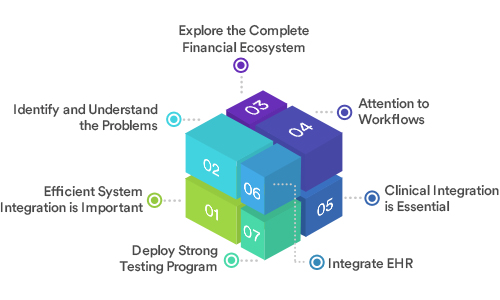
Financial information systems in healthcare can transform operations and improve care quality. However, providers need to consider best practices for the effective development of financial information systems in healthcare. So, here are the 7 tips useful for successful financial management in healthcare.
1. Efficient System Integration is Important-
Effective Integration of financial information systems is essential. If your hospital is integrating financial information system, then you must know it’s a complex process. It requires a specific skill set to effectively incorporate the system into the existing one. Moreover, opting for a third-party vendor for integrating the financial information system is a better choice. It becomes easier and effective Integration can be achieved. Above all, you need to ensure that the Integration has HIPAA compliance.
2. Identify and Understand the problems-
Whenever implementing or developing a new system; it’s crucial to identify the barriers. Financial information management in healthcare faces multiple challenges. So, the development and implementation of financial information systems must consider providers’ issues. Similar to health information systems, financial information is also developed to mitigate providers’ financial issues. Hence, identifying financial loopholes and understanding them to develop effective solutions is a must factor to consider. Healthcare analytics solutions can indirectly help in identifying the issues here.
3. Explore the complete financial ecosystem-
Before developing the financial information system of healthcare providers must first understand their existing financial ecosystem. It will help to analyze their requirements from the financial information system. Moreover, it will also help the smooth transition of the financial information system.
4. Attention to Workflows-
Many providers adopt technologies to streamline their workflows. Similarly, a hospital financial information system ensures better workflow in managing revenue and expenditure. This provides more efficiency of the system and better care too. Moreover, such financial information system in healthcare helps hospitals improve their cash inflow and boost ROI.
5. Clinical Integration is essential-
Financial system integration with clinical software of hospitals is a wise decision. Different systems mean a different set of data. But clinical Integration with financial information systems in healthcare can simplify many revenue and payment claims processes. Clinical data analytics with financial information can also improve the care quality and patient experience. This results in more lead generation and increased revenue. Such Integration also helps large-scale hospitals, especially those dealing with population health management. Besides, clinical Integration with financial information systems must ensure proper medical records management to avoid complexities later.
6. Integrate EHR-
Whether it’s a medical billing solution or telehealth, EHR integration is necessary. It resolves several complexities as EHR data becomes easily accessible. The finance system in healthcare integrated with EHR can make the process more efficient. Moreover, analyzing the financial information is also effective. It benefits the workflow too. So, developing financial information systems with EHR integration is a major factor to consider in todays’ health scenario.
7. Deploy Strong Testing Program-
Any technology development and implementation are bound to face risks. However, a robust testing program can resolve this and make the implementation smoother. Besides, leveraging financial systems often requires multiple iterations and facing changes in the environment. So, testing over a specific period is a good practice. Testing at multiple levels of development is also essential to meet expectations. Besides, it’s a great practice to test skilled developers who have worked on the system to test, devise test plans, document and report the financial system.
Conclusion
The financial information system in healthcare today is a growing space. Financial IT developers understand the need for a robust system to store, organize and analyze sensitive business information. So, financial information systems in hospitals are the robust solutions that providers need for managing data related to their hospitals’ assets, liabilities, and other costs. If you want to implement or develop a financial information system in healthcare, opting for a customized one is better. Opt for a vendor to develop hospital financial information systems according to your organizational needs and budget. Besides, financial information system based on cloud-computing healthcare is beneficial for providers. A cloud-based financial information system ensures better privacy and accessibility of critical financial data. Above all, developing and deploying financial information systems in healthcare is today’s need of the hour. Providers aiming to grow financially in the coming years must think about this software and its impact on business profits.
OSP is a trusted software development company that delivers bespoke solutions as per your business needs. Connect with us to hire the best talents in the industry to build enterprise-grade software.
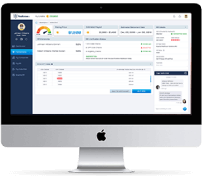
How can we help?
Fill out the short form below or call us at (888) 846-5382
Looking for software solutions to build your product?
Let's discuss your software solutions for your product in our free development acceleration call!
Get In Touch arrow_forwardDiscuss Your Project Handover with a team of expert Book a free consultation arrow_forward
About Author

Written by Riken Shah linkedin
Riken's work motto is to help healthcare providers use technological advancements to make healthcare easily accessible to all stakeholders, from providers to patients. Under his leadership and guidance, OSP Labs has successfully developed over 600 customized software solutions for 200+ healthcare clients across continents.












